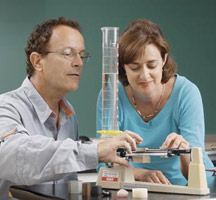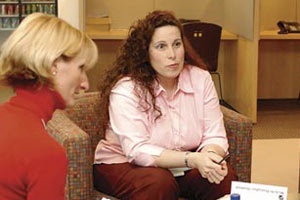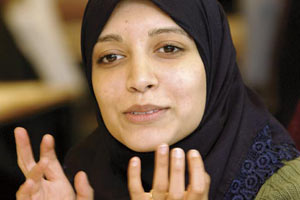
State of the Teaching Profession 2004
Confidence in public education on the rise
by Brian Jamieson
Celebrating Franco-Ontarian Youth
Report from the 11th Jeux Franco-Ontariens
by Gabrielle Barkany
Sharing Our Stories
Reflecting on teachers' mentoring experiences
by Brian Jamieson
Mapping the Journey to Student Success
Silver Springs PS aspires to seamless curriculum delivery
by Leanne Miller
Sharing Our StoriesAt a recent College case-writing institute, mentors and protegés reflected on and recorded their experiences - developing a guidebook for others who embark on mentoring's road.by Brian Jamieson |
 |
Diane Goldhawk remembers what it was like as a neophyte teacher. She remembers the calming words of a vice-principal who helped her through that stress-filled first year. The memories made it easy for Goldhawk to volunteer as a mentor to novice teacher Sarah Parke this past year.
Goldhawk, a 17-year veteran who teaches at R.S. McLaughlin Collegiate and Vocational Institute in Oshawa, and protégé Parke were among 35 Ontario teachers who gathered at the College in April for a two-day case-writing institute. Remembering and writing what they accomplished together will help to enhance mentoring programs and new teacher induction across Ontario.
The institute gave teachers a chance to pause, analyze and collect their experiences in story form for a casebook on mentoring. By recollecting the dilemmas and surprises in honest and contextual detail, participants served up a guidebook for would-be mentors, school administrators and newly certified teachers.
"These issues will possibly crop up somewhere," Goldhawk says, adding that the casebook will be invaluable to mentors, allowing them to imagine themselves in certain situations and to work through issues and solutions ahead of time.
Writing it down
Yvette Quigley appreciated the writing process. Her newly certified colleague Jackie-Ann Stewart questioned it. Quigley, an experienced Grade 1 teacher with the Durham Catholic DSB, valued the opportunity to reflect on her practice. Stewart wanted more tips, techniques and strategies to see her through the common obstacles for teachers in their early years. Different personalities and teaching styles mean what works for one may not work for the other. But the two share ideas, take the best from each other, adapt and move forward.
 |
Diane Goldhawk of R.S. McLaughlin Collegiate and Vocational Institute in Oshawa and Michelle Donaghue-Stanford from St. Angela Catholic School in Toronto share their experiences as mentors in one of the break-out sessions. |
"Mentoring makes me more aware of what I'm doing because I want to give the best advice I can," says Quigley. "I'm more focused on the organization and strategy that I've used and sharing the things I do that work for me. In September, Jackie-Ann was very anxious. Now it's more of a team effort. It's what can we do?"
Quigley and Stewart agree that the mutual support provided by their relationship helped when communication problems arose with a parent who disagreed with the assessment of a child's abilities. By reminding each other, "We're here for the kids," they were able to stay focused through a difficult situation.
Mentoring recommended
College data shows that most newly hired Ontario teachers don't get the support they need to start their careers properly and many are at risk of leaving teaching altogether. More than half of new teachers are hired after school starts in September. One in five are asked to teach subjects they haven't been trained to teach.
They want additional support from senior colleagues in the first couple of years of teaching to learn how to manage classrooms, evaluate student achievement and communicate with parents.
The first year of teaching is very stressful. "It's important to know there's someone there who can say, 'It's okay, I'll be your sounding board. I'll help you through anything,'" says Goldhawk. "If you're not a teacher you don't understand it."
Last December the College released a policy paper recommending the creation of a mandatory two-year program of support, including mentoring, for Ontario's newly certified teachers in every publicly funded school board. As teaching professionals move to respond to these identified needs, case studies will be invaluable in developing programs that work.
Casebooks give teachers situations to examine and ask, "What would I have done differently?" says Rhodora Vanderpool, a Grade 8 teacher at the Toronto Catholic District School Board's St. Angela Catholic School.
Vanderpool's mentor, Michelle Donaghue-Stanford, also a Grade 8 teacher but in her 13th year of teaching, thinks the casebook will be of particular use to veteran teachers and school principals starting a mentoring program. "Maybe these case studies will help people decide whether they are the right people to be mentors."
Those reading the cases will readily identify with real teachers in real situations, dealing with the complexities of classroom management.
Support for success
Donaghue-Stanford reflects on her own early years. "I thought teaching was so great, wonderful and terrific that I probably didn't even think about some of the things that were coming my way at the time."
Vanderpool describes mentoring as a relationship, a friendship and an ongoing process. "You will find mentors throughout your career. You should always be finding someone to help you through your journey. It's not just about the first year."
Hélène Desgagné provides further proof of Vanderpool's point. Despite 18 years of experience as an elementary teacher, Desgagné was a novice this past year - teaching science to special-needs students at Conseil scolaire catholique du Sud-Ouest's école secondaire Pain Court.
"If I hadn't had a mentor, it would have been worse than a challenge - it would have been a nightmare," says Desgagné. "The subject was new to me. Without mentoring I might not have found my way in the curriculum. I would have been lost at the evaluation stage. My mentor taught me how to teach the subject, bring it to life and adjust it to the level of my students."
 |
During the case institute, novice and experienced teachers reflected on the mentoring experience and on their teaching methods relative to their understanding of the Standards of Practice for the Teaching Profession and the Ethical Standards. |
Guy Deslauriers, a 24-year veteran, says it was fascinating to watch Desgagné progress along with her students.
"I showed Hélène how to teach the regular science class and how to adapt it for special needs students. The students felt great because they could conduct the same experiments as students in regular science classes, using microscopes, the periodic table and electrical circuits. They felt empowered."
Desgagné told her story with humour - raising the question, "Good Lord, what am I going to do?" as a reminder to colleagues not to be afraid to ask questions, regardless of how much experience they have.
"We must be humble in our profession," she says. "Even with 18 years of experience, I wasn't afraid to ask questions. Mentoring is a must for young and experienced teachers alike."
Thorny issues
The mentoring experience can prove uncomfortable for some.
"If we want to establish a mentoring program, it's important that we define roles, responsibilities and expectations for the mentor and the mentee," says one teacher whose experience with a younger colleague did not work out. "Both parties should know these things. The mentor isn't a mother or a secretary or a clown. The mentee isn't in a paid practicum."
This participant spoke of the challenge she faced when her mentoring role raised dilemmas concerning her own sense of professional ethics. "I couldn't talk to management or a colleague about the problems we were having because in a school you can't openly criticize someone. I didn't want to put her down or risk her losing her job because of me. It's touchy and can cause grief."
Everyone needs help
"Mentors need mentors too," says Peter Brodribb, a high school English and media studies teacher with the Ottawa-Carleton District School Board.
"After 30 years I'm still experiencing dilemmas and difficulties," Brodribb says. "The notion of ongoing discussion about what we do is fundamental to refining and improving our teaching practice.
"It's one thing to reflect in a journal, another to think out loud. I value the notion of a group of teachers sitting around and hearing from each other about the situations they're in."
Brodribb called case writing a validating exercise, one that taught him to look sideways in order to go forward.
"It's not a sacrifice for me to work as a mentor because it improves my teaching. It's an open forum where I can contribute my vision of how I see my relationship with my students, colleagues and so on. Mentoring breaks free of more hierarchical approaches to leadership."
Common concerns
In sharing their experiences, participants also drew conclusions about the issues surrounding mentoring.
Mentors identified various areas of concern:
- balancing the needs of their protegés with their own
- supporting colleagues who face challenges at other stages in their careers
- handling added workloads with time constraints
- developing a mentoring/collaborative culture in schools
- nurturing relationships with their colleagues.
Novices' issues included:
- curriculum challenges
- establishing relationships with other staff
- feeling they were calling on their mentor too much
- balancing everything
- communicating effectively with parents
- assessment and evaluation.
For information on this and other case institutes, contact Deirdre Smith, Manager, Standards of Practice and Education Unit, 416-961-8800 (toll-free in Ontario 1-888-534-2222), ext. 877, dsmith@oct.ca.




